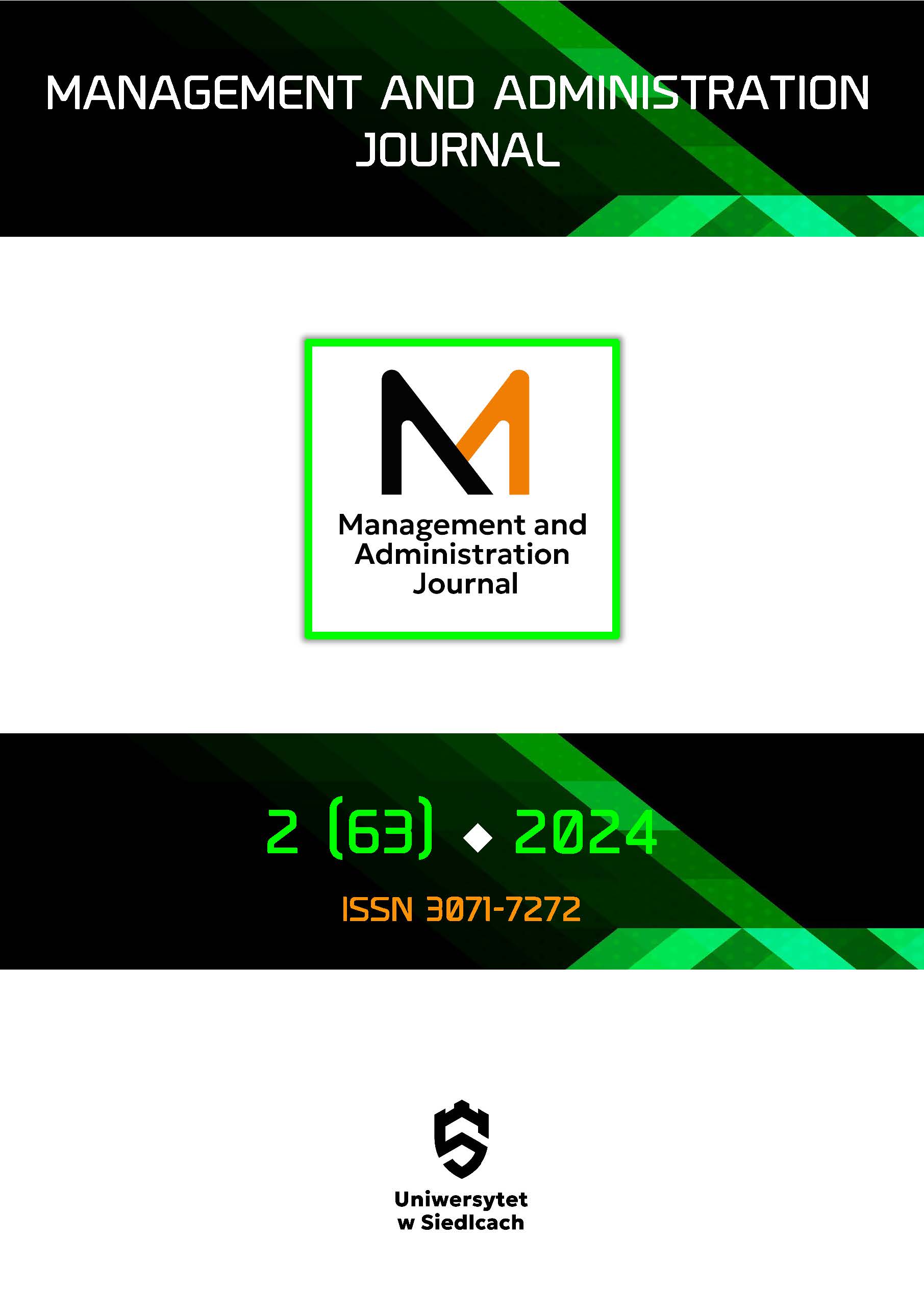CUSTOMER KNOWLEDGE MANAGEMENT (CKM) USING ORGANIZATIONALLEARNING PROCESSES
DOI:
https://doi.org/10.34739/maj.2024.02.05Keywords:
konowledge management, customer knowledge management, organizational learning processAbstract
The paper addresses the role and essence of customer knowledge management (CKM). The relationship between knowledge management and CKM is described. The main goal is to present the use of organizational learning processes in CKM. Organizational learning processes were characterized based on the author's concept of sub-processes of traditional, empirical and cybernetic organizational learning, the cycles of these processes, changing types of knowledge, main knowledge processes and their categories in CKM. Examples of instruments for implementing organizational learning in CKM are also
provided. The publication/article present the result of the Project no 052/ZZZ/2023/POT financed from the subsidy granted to the Krakow University of Economics.
Downloads
References
Alavi, M., Leidner, D.E. (2001). Knowledge management and knowledge management systems: Conceptual foundations and research issues. MIS quarterly, 107-136.
Belkahla, W., Triki, A. (2011). Customer knowledge enabled innovation capability: proposing measurement scale. Journal of Knowledge Management, 15(4), 648-674. DOI: https://doi.org/10.1108/13673271111152009.
Chaithanapat, P., Rakthin, S. (2021). Customer knowledge management in SMEs: Review and research agenda. Knowledge and Process Management, 28(1), 71-89. DOI: 10.1002/kpm.1653.
Curado, C., Bontis, N. (2006). The knowledge-based view of the firm and its theoretical precursor. International Journal of Learning and Intellectual Capital, 3(4), 367-381.
Dieng-Kuntz, R. (2006). Corporate Semantic Webs, in: Schwartz, D. (Ed.), Encyclopedia of Knowledge Management (pp. 67-80). Hershey–London–Melbourne–Singapore: Idea Group Reference.
Gawron, I., Mikuła, B. (2020). Wprowadzenie do zarządzania. Rozwój, funkcje, koncepcje. [Intro-duction to management. Development, functions, concepts]. Nowy Sącz: Wydawnictwo Naukowe Państwowej Wyższej Szkoły Zawodowej w Nowym Sączu.
Ge, Y. (2022). The impact of dynamic knowledge management capability on enterprise innovation performance. Operations Management Research, 15(3), 1048-1059. DOI: https://doi.org/10.1007/s12063-021-00251-7.
Gebert, H., Geib, M., Kolbe, L., Brenner, W. (2003). Knowledge-enabled customer relationship management: integrating customer relationship management and knowledge management concepts. Journal of Knowledge Management, 7(5), 107-123.
Gibbert, M., Leibold, M., Probst, G. (2002). Five styles of customer knowledge management, and how smart companies use them to create value. European Management Journal, 20(5), 459-469.
Khosravi, A., Rajabzadeh, M., Zaloga, V., Dyadyura, I. (2022). Customer knowledge management in enterprise software development companies: organizational, human and technological perspective. Management Systems in Production Engineering, 30(4), 291-297. DOI:10.2478/mspe-2022-0037.
Kuchta, P., Zajkowska, M., Boguszewicz-Kreft, M. (2018). Wiedza klienta jako strategiczny zasób przedsiębiorstwa w kontekście rozwoju innowacji. [Customer knowledge as a strategic enterprise resource in the context of innovation development], Zarządzanie i Finanse, 16(3.3), 147-158.
Maier, R. (2002). Knowledge Management Systems. Information and Communication Technologies for Knowledge Management. Berlin: Springer-Verlag.
Mazur, J., Rószkiewicz, M., Strzyżewska, M. (2008). Orientacja na wiedzę a wyniki ekonomiczne przedsiębiorstwa: wyniki badań średnich przedsiębiorstw funkcjonujących w Polsce. [Knowledge orientation and the economic results of the enterprise: research results of medium-sized enterprises operating in Poland]. Warszawa: Szkoła Główna Handlowa w Warszawie – Oficyna Wydawnicza.
Miake, A.H.S., Carvalho, R.B., Pinto, M. (2014). Gestão do conhecimento do cliente (CKM): interfaces e sinergias entre a gestão do relacionamento com clientes (CRM) e as ferramentas de gestão do conhecimento, in: XVII Semead. Seminários em Admi-nistração. FEA-USP, São Paulo.
Mikuła, B. (2005a). Procesy organizacyjnego uczenia się w aliansie strategicznym. [Organizational learning processes in a strategic alliance], Przegląd Organizacji (5), 9-12.
Mikuła, B. (2005b). Procesy uczenia się w organizacji. [Learning processes in the organization], Ze-szyty Naukowe Akademii Ekonomicznej w Krakowie (672), 19-34.
Mikuła, B. (2018). Knowledge Management System in the Enterprise and Customer Knowledge Management in Contemporary Issues, in: Babić, V. (Ed.). Economics, Business and Management (19-27). Kragujevac: Faculty of Economics, University of Kragujevac.
Mikuła, B. (2021). CKM jako narzędzie poprawy jakości produktów i relacji z klientami [CKM as a tool for improving product quality and customer relations], in: Stan i perspektywy rozwoju jakości w XXI wieku: rozwiązania i dylematy. Księga jubileuszowa z okazji 45-lecia pracy naukowej Profesor Elżbiety Skrzypek [The state and prospects of quality development in the 21st century: solutions and dilemmas. Jubilee book on the occasion of the 45th anniversary of the scientific work of Professor Elżbieta Skrzypek] (pp. 235-246). S. Tkaczyk, T. Wawak (Eds.). Lublin: Uni-wersytet Marii Curie-Skłodowskiej w Lublinie.
Mikuła, B. (2022). Organizacja ucząca się – rodzaje, poziomy, sposoby i ograniczenia uczenia się przedsiębiorstwa. [Learning organization – types, levels, methods and limitations of enterprise learning], in: Uwarunkowania współczesnego zarządzania [Conditions of contemporary management] (16-31). Makowiec, M., Mikuła, B. (red.). Nowy Sącz: Akademia Nauk Stosowanych w Nowym Sączu.
Mikuła, B. (2023). Transfer wiedzy i instrumentalizacja jego realizacji w zarządzaniu wiedzą klienta. [Knowledge transfer and instrumentalization of its implementation in client knowledge management], e-mentor, 3(100), 12-21, DOI: https://doi.org /10.15219/em100.1619.
Mikuła, B., Pietruszka-Ortyl, A., Potocki, A. (2002). Zarządzanie przedsiębiorstwem XXI wieku. Wybrane koncepcje i metody. [Business management of the 21st century. Selected concepts and methods], Warszawa: Difin.
Nonaka, I., Takeuchi, H. (2000). Kreowanie wiedzy w organizacji. [Creating knowledge in the organization]. Warszawa: Poltext.
Paquette, S. (2006). Customer Knowledge Management. in: Encyclopedia of Knowledge Management (90-96). Schwartz, D. (Ed.). Hershey–London–Melbourne–Singapore: Idea Group Refer-ence.
Rollins, M., Halinen, A. (2005). Customer knowledge management competence: Towards a theoretical framework. in: Proceedings of the 38th Annual Hawaii International Conference on System Sciences (pp. 1-10), Hawaii: IEEE.
Sawhney, M., Prandelli, E. (2000). Beyond customer knowledge management: customers as knowledge co-creators. in: Knowledge management and virtual organizations (pp. 258-281). IGI Global.
Śliwińska, I. (2016). Customer knowledge management in the example of functional food, in: Knowledge – economy – society. Strategies, concepts and instruments of management (pp. 199-205). R. Oczkowska, A. Jaki i B. Mikuła (Eds.), Cracow: Cracow University of Economics, Foundation of the Cracow University of Economics.
Valente, R. (2020). The knowledge-based economy: an integrated macroeconomic and management approach to the analysis of major forces affecting the evolution of modern economies. Nierówności Społeczne a Wzrost Gospodarczy (62), 256-277, DOI: 10.15584/nsawg.2020.2.17.
Downloads
Published
Issue
Section
License
Copyright (c) 2024 Management and Administration Journal

This work is licensed under a Creative Commons Attribution-NonCommercial 4.0 International License.





